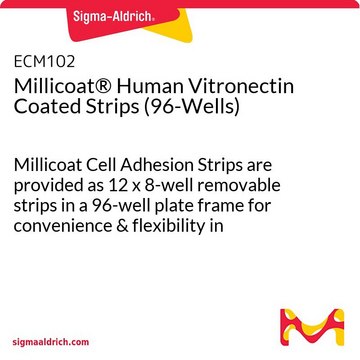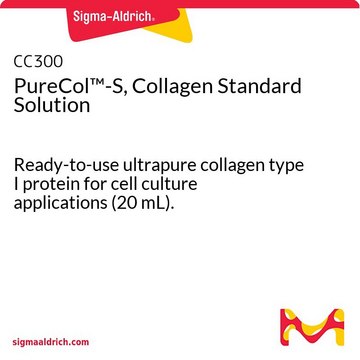26001K
MAPTrix™ Reagent
Low Molecular Weight, lyophilized powder
Faça loginpara ver os preços organizacionais e de contrato
About This Item
Código UNSPSC:
12352202
NACRES:
NA.75
Produtos recomendados
esterilidade
sterile
Formulário
lyophilized powder
peso molecular
~22.6 kDa
embalagem
pkg of 100 mg
pkg of 5 mg
técnica(s)
cell culture | mammalian: suitable
Condições de expedição
ambient
temperatura de armazenamento
2-8°C
Descrição geral
MAPTrix™ Reagent intended for use as adhesive hydrogel or dispersion agent.
Aplicação
MAPTrix™ Technology provides a true extracellular microenvironment (ECM) by presenting combinatorial peptide motifs. The ECM, defined by biochemical cues and physical cues, is a deciding factor in a wide range of cellular processes including cell adhesion, proliferation, differentiation, and expression of phenotype-specific functions.Currently existing technology offers simple and merely adequate environments that facilitate simple cell processes such as cellular adhesion. The simple presentation of cell adhesion motifs is not optimal for controlling more integrated processes. Crosstalk among signaling pathways act synergistically to enhance cellular responses such as cell adhesion or proliferation. A study showed that a combination of extracellular matrix derived peptides presented on a surface may enhance cell adhesion strength and focal adhesion assembly. The combinatorial presentation of ECM peptides on cell growth surfaces may also promote elevated proliferation rates of primary or stem cells.
Características e benefícios
- Biochemically-defined, animal-free cell culture surfaces designed to enhance cell performance
- MAPTrix™ produces a uniform ECM surface that provides a highly controlled 2D extracellular microenvironment for cell cultures and related applications
- Adhesion properties of the mussel adhesive protein makes the coating reproducible & reliable
Informações legais
MAPTrix is a trademark of Kollodis Biosciences
Código de classe de armazenamento
11 - Combustible Solids
Classe de risco de água (WGK)
WGK 3
Escolha uma das versões mais recentes:
Certificados de análise (COA)
Lot/Batch Number
Lamentamos, não temos COA para este produto disponíveis online no momento.
Se precisar de ajuda, entre em contato Atendimento ao cliente
Já possui este produto?
Encontre a documentação dos produtos que você adquiriu recentemente na biblioteca de documentos.
Stephanie J Ellis et al.
Cell and tissue research, 339(1), 121-130 (2009-07-10)
The regulation of stem cell behavior and maintenance typically involves the integration of both intrinsic and extrinsic cues. One such external cue, integrin-mediated cell adhesion to the extracellular matrix, plays an important part in regulating stem cell function and maintenance.
Ying Meng et al.
FASEB journal : official publication of the Federation of American Societies for Experimental Biology, 24(4), 1056-1065 (2009-11-26)
Human embryonic stem (hES) cells are pluripotent, capable of differentiating into any cell type of the body, and therefore have the ability to provide insights into mechanisms of human development and disease, as well as to provide a potentially unlimited
Seung Tae Lee et al.
Biomaterials, 31(6), 1219-1226 (2009-11-21)
We present development and use of a 3D synthetic extracellular matrix (ECM) analog with integrin-specific adhesion ligands to characterize the microenvironmental influences in embryonic stem cell (ESC) self-renewal. Transcriptional analysis of 24 integrin subunits followed by confirmation at the translational
Samuel Schmidt et al.
Cell and tissue research, 339(1), 83-92 (2009-11-19)
Adhesion and migration are integrated cell functions that build, maintain and remodel the multicellular organism. In migrating cells, integrins are the main transmembrane receptors that provide dynamic interactions between extracellular ligands and actin cytoskeleton and signalling machineries. In parallel to
S J Fashena et al.
Nature cell biology, 2(12), E225-E229 (2001-01-09)
Over the past twenty years, intensive research has enabled us to identify components of specific signalling pathways downstream of an array of adhesion and growth-factor receptors. The first Gordon Research Conference on 'Signalling by Adhesion Receptors', which took place in
Artigos
Extracellular matrix proteins such as laminin, collagen, and fibronectin can be used as cell attachment substrates in cell culture.
Nossa equipe de cientistas tem experiência em todas as áreas de pesquisa, incluindo Life Sciences, ciência de materiais, síntese química, cromatografia, química analítica e muitas outras.
Entre em contato com a assistência técnica







